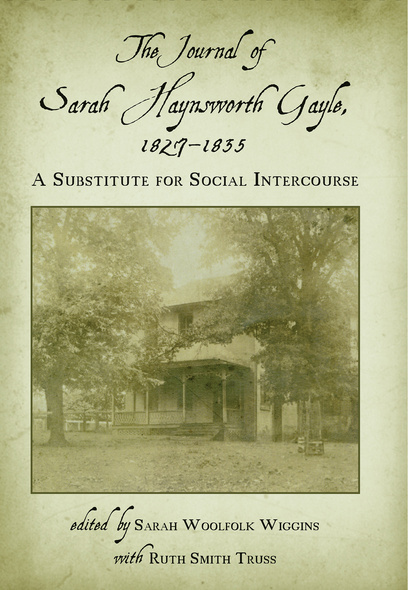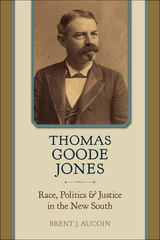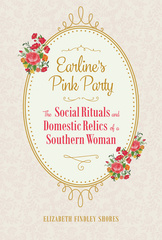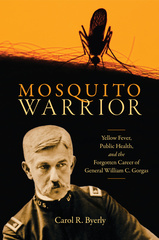
384 pages, 6 x 9
13 B&W FIGURES
Paperback
Release Date:15 Nov 2023
ISBN:9780817361181
Hardcover
Release Date:05 Nov 2013
ISBN:9780817313333
The Journal of Sarah Haynsworth Gayle, 1827–1835
A Substitute for Social Intercourse
University of Alabama Press
Astonishing, tragic, and remarkable, the journal of Sarah Haynsworth Gayle, wife of early Alabama governor John Gayle, is among the most widely studied and seminal accounts of antebellum life in the American South. This is the first complete edition of the journal in print.
Bereft of the companionship of her often-absent husband, Sarah considered her journal “a substitute for social intercourse” during the period from 1827 to 1835. It became the social and intellectual companion to which she confided stories that reflected her personal life and the world of early Alabama. Sarah speaks directly to us of her loneliness, the challenges of child rearing, her fear of and frustration with the management of slaves, and the difficulty of balancing the responsibilities of a socially prominent woman with her family’s slender finances.
The poor condition of the journal and its transcripts, sometimes disintegrated or reassembled in the wrong order, has led historians to misinterpret Gayle’s words. Gayle’s descendants, Alabama’s famed Gorgases, deliberately obscured or defaced many passages. Using archival techniques to recover the text and restore the correct order, Sarah Wiggins and Ruth Truss reveal the unknown story of Sarah’s economic hardships, the question of her husband’s “temperance,” and her opium use.
The only reliable and unexpurgated edition of Sarah Gayle’s journal, now enhanced with a fascinating introduction and inset notes, The Journal of Sarah Haynsworth Gayle, 1827–1835, is a robust and gripping account and will be of inestimable value to our understanding of antebellum society, religion, intellectual culture, and slavery.
Published in cooperation with the University Libraries, The University of Alabama, with further financial support from the Library Leadership Board, the University Libraries, The University of Alabama.
While her husband worked in politics, Sarah Gayle managed the family household in Claiborne and later Greensboro, raising their six children and overseeing the family’s slaves. Isolated and lonely, Gayle found solace in her journal, which she never intended strangers to read. Her candor openly reveals her struggles with bearing and raising children, slave management, health issues, acquaintances, and being wife to an absent husband. . . . [the journal] provides valuable insight into the lives of white antebellum southern women and, as this is the only extant journal of an Alabama woman from this period, a valuable source about white Alabama women from the era. Highly recommended.’
—CHOICE
'The journal kept by Sarah Haynsworth Gayle (1804-1835) illustrates poignantly how much women’s lives have changed since the early nineteenth century . . . Sarah Woolfolk Wiggins and Ruth Smith Truss have achieved an impressive reconstruction of Gayle’s journal, which some legacy-minded descendants had disordered and defaced. The resulting definitive text is a treasure for scholars of antebellum frontier, southern, and women’s history.’
—The Journal of Southern History
'Gayle's writerly eloquence, psychological acuity, and emotional accessibility earn her book a place among the works of Frances Kemble, Phoebe Yates Levy Pember, and Mary Boykin Chesnut. With enormous patience and care, the editors have crafted a model edition, the lucid apparatus of which never intrudes on the journal's power as a page-turner.' —Julia Stern, author Mary Chesnut's Civil War Epic
Anyone interested in the lives of early-nineteenth century women will rejoice at the publication of this important edition of Sarah Haynsworth Gayle’s engaging journal. Married at fifteen in near-frontier Alabama to John Gayle, a young lawyer who would quickly rise as a jurist and politician to serve as the state’s seventh governor, Sarah Gayle filled the days and weeks of her husband’s absences by recording in a free-flowing journal her daily concerns, memories of her own childhood, her hopes and fears for her children, and her struggles to manage the slaves who served her. Sarah writes with a lively intelligence and a clear eye, giving us a rare extended look at a woman’s world. She recounts jokes and joys, but hers is a world punctuated by childbearing, illness, and death; one by one her girlhood friends suffer loss, sicken and die. Only twenty-three when she begins the journal, Sarah has already borne several children, and mourns her youth and her beauty (she fears that the loss of her teeth will lessen her husband’s love for her). Her death from tetanus at the age of thirty-one left six young children—and a matchless legacy in this journal.’
—Elisabeth Muhlenfeld, author of Mary Boykin Chesnut: A Biography
‘We have in Sarah Gayle’s Journal the captivating story of a remarkable life. Its sharp focus on a variety of issues in Alabama during a specified period is unique. Gayle’s story finds its center not in over-arching political power of the day, masterful triumphs in business, or the insatiable lust for land, although she is a keen observer of those things, especially in her husband, or her friends’ lives. Gayle’s contribution to Alabama, to scholarship, and to the generation then unborn—to us—is her human story. Her life resonates because we can hear the vibrant heartbeat of her community, and sense the fear and excitement of the time when she still lived so remarkably close to an American frontier that she and others worked so feverishly to transform.’
—Jimmie Lewis Franklin, author of Back To Birmingham: Richard Arrington, Jr. and His Times
Sarah Woolfolk Wiggins and Ruth Smith Truss have performed an invaluable service in editing Sarah Haynsworth Gayle’s insightful, perceptive journal she kept between 1827 and 1835. This diary had been in various stages of disrepair, with incomplete, defaced sections and scattered, unreadable pages. [Gayle] begins writing her journal as a young mother during her husband’s rising political career. His frequent and lengthy absences mean she often finds herself alone, a ‘sort of widowhood,’ as she characterized her situation. In her journal, Sarah describes her daily experiences, often in intimate detail, and pours out her heart until dying of lockjaw in 1835, not yet thirty-one years old. Sarah’s thoughts on courtship and marriage, her descriptions of daily activities with family and friends, her church-going and strong reactions to various ministers, and her several health problems due to bad teeth and an opium addiction are fascinating to read. Like so many other women in similar circumstances, it was female friendships that sustained her.’ —Sally G. McMillen, author of Motherhood in the Old South: Pregnancy, Childbirth, and Infant Rearing and Southern Women: Black and White in the Old South
‘Sarah Woolfolk Wiggins and Ruth Smith Truss have made this challenging manuscript available to a much wider audience in a superbly edited edition. Sarah Gayle offers a fascinating look into the world of antebellum marriage and motherhood in a journal filled with valuable information on social life, religion, slaveholding, mental anguish, drug use, and a host of other important topics. Invaluable.’
—George C. Rable, author of God's Almost Chosen Peoples: A Religious History of the American Civil War
Sarah Woolfolk Wiggins is professor emerita of history at the University of Alabama, a past president of the Alabama Historical Association, and editor of the Alabama Review for twenty years. She is the author or editor of The Scalawag in Alabama Politics, 1865–1881; From Civil War to Civil Rights—Alabama 1860–1960; The Journals of Josiah Gorgas, 1857–1878; and Love and Duty: Amelia and Josiah Gorgas and Their Family.
Ruth SmithTruss is a professor of history and department chairman at the University of Montevallo, has published several articles related to Alabama history, is president of the Friends of the Alabama Archives, and served on the board of directors of the Alabama Historical Association.
Ruth SmithTruss is a professor of history and department chairman at the University of Montevallo, has published several articles related to Alabama history, is president of the Friends of the Alabama Archives, and served on the board of directors of the Alabama Historical Association.








